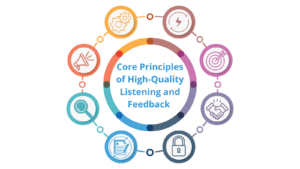
These principles, created by the feedback community, reflect the latest evidence about what high-quality listening and feedback look like for nonprofits and philanthropic funders alike. Would you like to share the Core Principles with your colleagues? Download a PDF version here and watch this webinar recording to learn more about how the Principles can help you transform your listening and feedback practices.
High-quality listening and feedback:

1. Share power with the people most affected by our work
High-quality listening and feedback processes recognize the power and expertise constituents have and support greater equity by shifting foundations and nonprofits from holding decision-making power over the people at the heart of their work to holding it with them.

2. Center the voices of people who are least heard
High-quality listening and feedback mechanisms are designed to be accessible to all and prioritize hearing and acting on feedback from people who are historically underrepresented in listening efforts and most affected by inequities.

3. Commit to action
While nonprofits and foundations may choose not to change in response to every individual piece of feedback or input, they recognize their overall responsibility (and commit) to acting on what they hear from constituents.

4. Protect constituents
High-quality listening and feedback processes are safe for constituents, ensuring their confidential information is protected and they aren’t put at risk of repercussions by participating.

5. Lead to continuous reflection, learning, and improvement
Systematically listening to, understanding, and acting on feedback and input as part of regular, on-going operations creates a culture of responsiveness and learning that leads to improvements as defined by people at the heart of the work.

6. Are transparent and participatory
High-quality listening and feedback processes make clear how input will be used and involve constituents in designing the process and interpreting what’s heard rather than extracting information without meaningful engagement.

7. Report back to constituents
Nonprofits and foundations “close the loop” with constituents as part of high-quality listening and feedback efforts by sharing what they heard from constituents and how they will act in response.

8. Are systematic
High-quality listening and feedback processes are integrated into internal systems and align with other efforts by nonprofits and foundations to center the voices of the people at the heart of their work in order to advance the systemic changes they seek.
Want support from Feedback Labs and the wider field as you work to embody these principles? Access resources for nonprofits, sign up for a training or attend a LabStorm. For philanthropic funders, reach out to Megan at [email protected] to learn more about our funder community of practice!
A quick word on how these principles were developed:
In 2018, the Irritants for Change, a group of leading feedback experts and nonprofit platforms, created an initial version of the Core Principles with input from many members of the wider feedback field. In 2024, the Irritants again collaborated with the field to update the principles to reflect the latest evidence about what practices matter most for high-quality listening and feedback loops and the key role that equity and inclusion play in high-quality listening and feedback.
